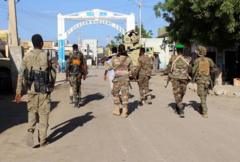*Officials in Somaliland believe that recognition from the U.S. can bolster their quest for statehood and global investment, amidst possible regional ramifications.*
**Somaliland Seeks Recognition from the U.S. Amid Geopolitical Shifts**

**Somaliland Seeks Recognition from the U.S. Amid Geopolitical Shifts**
*As tensions rise in East Africa and trade wars brew, Somaliland makes its statehood ambitions known.*
In a bold move on the Horn of Africa, Somaliland—a self-declared independent region from Somalia—has intensified its aspirations for international recognition. With a population of around five million, Somaliland has been operating autonomously since 1991, complete with its own currency, passport, and an array of functioning governmental institutions. As it seeks to solidify its status, Somaliland is looking to strike a significant deal with the U.S. government, aiming for statehood in exchange for leasing its strategically located Berbera Port and airstrip.
Last month, dock workers were busy unloading goods at the bustling Berbera Port, a key artery for global trade that faces ongoing threats from conflict in neighboring Yemen. Somaliland officials have invested years establishing connections with influential Republican lawmakers and think tanks and now see an opportunity to secure a formal relationship with the United States under the Trump administration.
An endorsement from the U.S. could not only affirm Somaliland's statehood ambitions but also attract much-needed investment and enhance security collaborations. However, experts and local analysts express that this recognition carries substantial risks. Acknowledging Somaliland's independence could evoke tensions with federal Somali authorities and potentially strengthen militant groups like Al Shabab. Furthermore, Western partners such as Egypt, Turkey, and the African Union may view this move warily, concerned that it may inspire similar secessionist movements across the continent.
As the U.S. weighs its options—amid security concerns prompting the potential closure of its Mogadishu embassy and ongoing conflicts affecting trade—Somaliland’s request represents a unique geopolitical pivot. The potential impact of this development reverberates beyond the borders of Somaliland, possibly reshaping the security dynamics and economic frameworks in East Africa, as the U.S. approaches this region in light of its ongoing rivalry with China.
Last month, dock workers were busy unloading goods at the bustling Berbera Port, a key artery for global trade that faces ongoing threats from conflict in neighboring Yemen. Somaliland officials have invested years establishing connections with influential Republican lawmakers and think tanks and now see an opportunity to secure a formal relationship with the United States under the Trump administration.
An endorsement from the U.S. could not only affirm Somaliland's statehood ambitions but also attract much-needed investment and enhance security collaborations. However, experts and local analysts express that this recognition carries substantial risks. Acknowledging Somaliland's independence could evoke tensions with federal Somali authorities and potentially strengthen militant groups like Al Shabab. Furthermore, Western partners such as Egypt, Turkey, and the African Union may view this move warily, concerned that it may inspire similar secessionist movements across the continent.
As the U.S. weighs its options—amid security concerns prompting the potential closure of its Mogadishu embassy and ongoing conflicts affecting trade—Somaliland’s request represents a unique geopolitical pivot. The potential impact of this development reverberates beyond the borders of Somaliland, possibly reshaping the security dynamics and economic frameworks in East Africa, as the U.S. approaches this region in light of its ongoing rivalry with China.






















